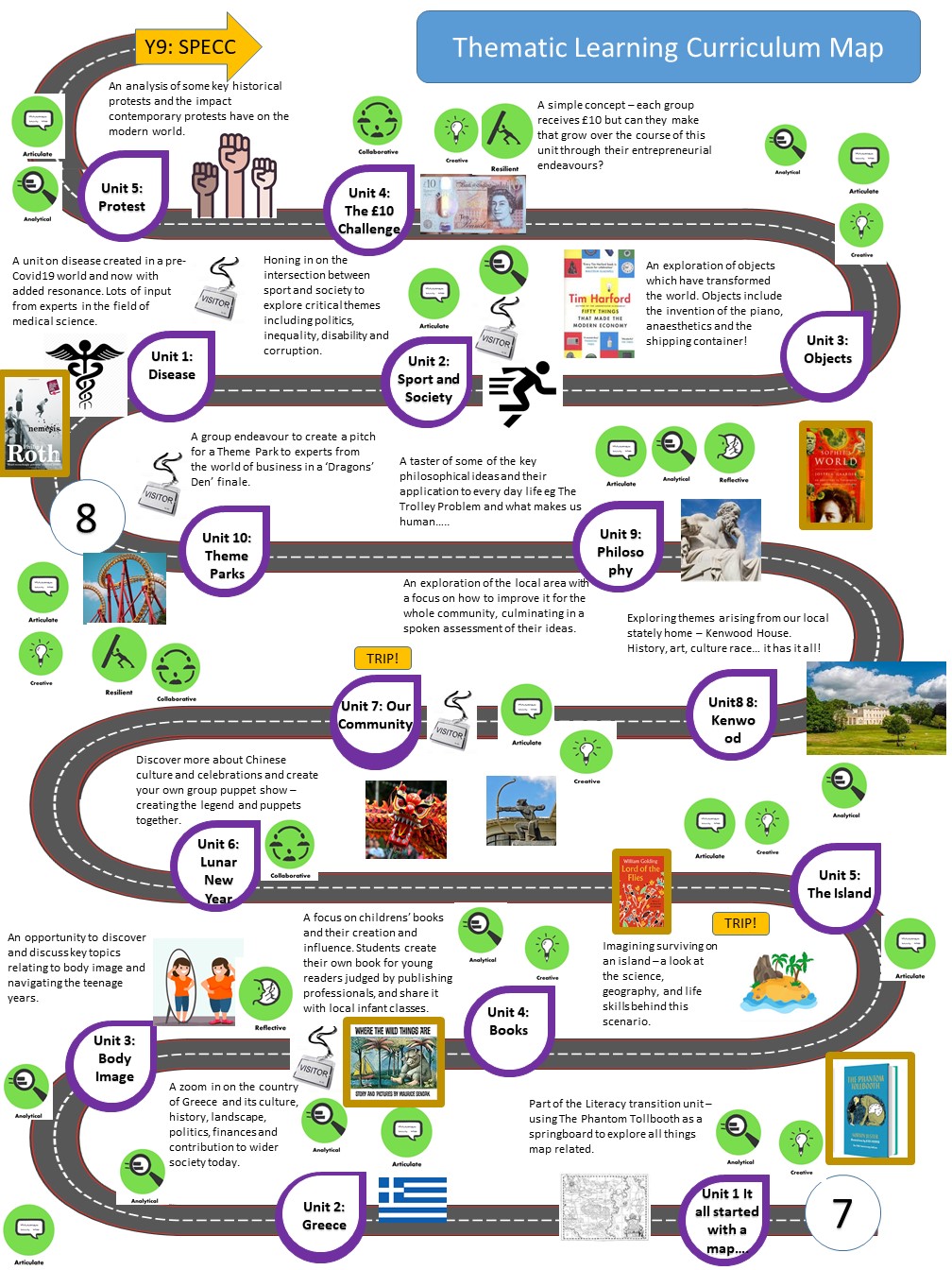Unique to The Archer Academy, Thematic Learning is a highlight of the Year 7 and 8 curriculum. Students study a variety of topics thematically rather than through the lens of one particular subject. It therefore crosses over into multiple disciplines well beyond the usual diet of a KS3 student. It is an opportunity to broaden horizons and hopefully encourage students to think and be curious.
Thematic Learning is not set in stone – we change the content each year to ensure it reflects contemporary interests and builds on student cultural capital. This dynamic means that the programme is always evolving and is building in strength year on year.
We are keen to ensure that students’ progress is measured and that the opportunity to learn thematically not only supplements their core KS3 programme but stands them in good stead for the subjects on offer at GCSE.
Furthermore, we hope that by encouraging them to synthesise and think laterally, we stimulate them to make connections between subjects and the world around them. Thematic Learning also provides an opportunity to do extra curricular activities for example, inviting in outside speakers and off site trips. This further extends our students’ understanding of a given theme or topic.
It is perhaps easiest to explain Thematic Learning by demonstrating what a topic, taught thematically, might look like.
Greece
Greece is an incredibly broad topic, so our Year 7 unit extends from accruing knowledge about the ancient world (eg Greek myths, influences of Ancient Greek on Modern English) to the modern European country (eg focusing on the migrant crisis, the Greek financial crisis, the thorny topic of the Elgin Marbles and Greece as a tourist destination). We find that as a result of the breadth of this approach the students touch on a huge array of knowledge and skills as far reaching as Classics, Politics, Economics and Linguistics – subjects not usually broached until A level or university! And to finish it off this year we had a Greek extravaganza whereby the students ate Greek food, learnt Greek dancing and re-enacted some of the ancient Greek tragedies on a 2 hour carousel led by their peers, external experts and our dedicated Thematic teachers.
Alongside this unit, Year 7s also have a unit focusing on books to tie in with World Book Day and Litfest which runs at school. As with the Greece unit, the parameters are broad – encountering magical realism, questioning whether Shakespeare plagiarised, why non-fiction books still outsell fiction in the day of the internet, and the genre of autobiography and its contribution to the literary world, to name a few.
Other units taught in Year 7
Luna New Year – at the end of which, students produce a shadow puppet show of their own creation.
Theme Parks – designing their own theme park culminating in a trip to Thorpe Park and pitching their ideas in a competitive Dragons’ Den (with real ‘dragons’ from the world of business)
Our Community – a focus on key issues in the local area. They research issues each lesson eg crime, traffic and the environment and then take some of these ideas outside eg on their ‘fieldtrip’ to East Finchley High Road or their first hand encounters with local dignitaries including councillors, religious leaders and school governors.
Year 8 is similarly broad and inspiring. A highlight for students this year was a new unit entitled Disease. Within this they found out about the impact of diseases as varying as Polio, Cholera, Spanish Flu, Malaria and HIV AIDS. This enabled students to explore both the scientific/ medical aspects of the topic as well as the historical and social elements. Spanish Flu for example was studied as a historical epidemic of 1918 but with the modern twist of Bird and Swine Flu. Within this we were very fortunate to invite in a few external speakers from the field of medicine and scientific research which extended the knowledge of students and staff further.
Other units taught in Year 8
Tenner Challenge – Students are given seed funding of £10 and 4 weeks to grow their business. Following the national ‘tenner challenge ‘ (formerly Young Enterprise’) the students work in groups to see how much profit they can make. Alongside their businesses students also develop their financial literacy as part of their life-long learning and careers programme.
Objects which changed the world – inspired by the Tim Harford books on the subject teachers pitch their own ideas for objects which changed the world ranging from the impact of the shipping container to anaesthetic to clocks! Students then have to evaluate each argument and put forward their own views of objects which have shaped the modern world.
Protest – a look at protest across time and place. What other course would take you on a 5 week journey from Black Lives Matter to the Suffragettes to Gandhi to Climate Rebellion to the London Riots? Students analyse features present in them all to assess what inspires people to take to the streets and what impact they might have on eliciting change.


